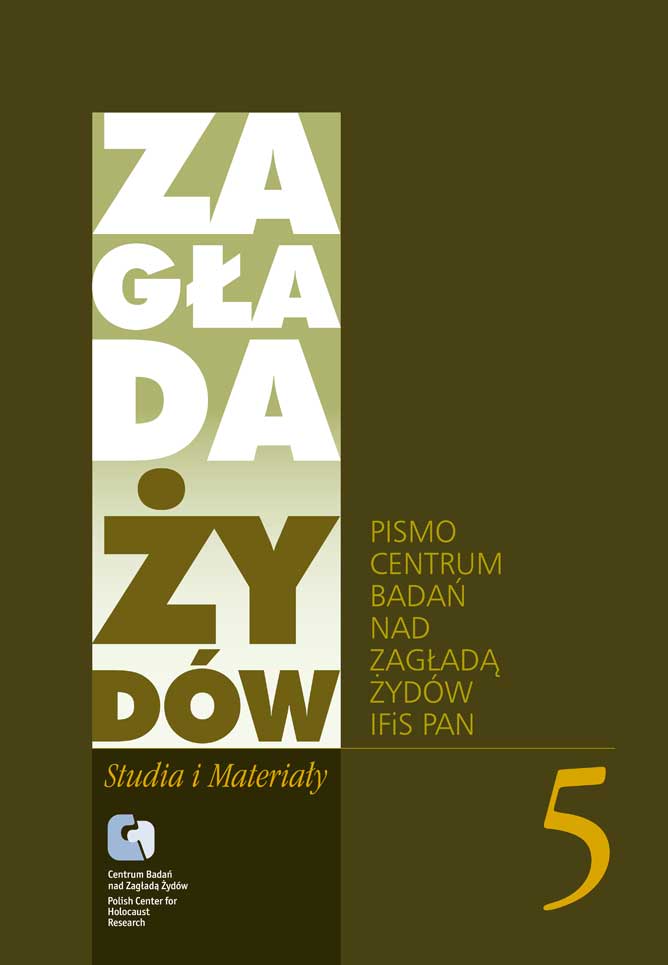Christian–Jewish Dialogue – with the Holocaust in the Background
Zagłada Żydów. Studia i Materiały, No. 5 (2009), Pages: 299-316
Submission Date: 2020-10-16Publication Date: 2009-11-09
 https://doi.org/10.32927/ZZSiM.318
https://doi.org/10.32927/ZZSiM.318
Abstract
Christian-Jewish dialogue is one of the most distinguishable results of the Conciliar Declaration Nostra Aetate, issued by the Catholic Church on 28 October 1965. The theological implications of the declaration are visible in Catholic theologians’ reflection, especially in the USA and Western Europe. The echoes of this debate are barely audible in Poland. Similarly to Judaism, also in Christianity there is no one and only answer to the Holocaust. It even seems that the attitude towards this event, to large extend, polarized Catholic theologians. It so happens that conservative tendencies in theology are usually connected with the unwillingness to incorporate the Holocaust into the reflection on the essence of Christianity. At the same time, open theology discerns a necessity not only to include the Shoah in the theology, but even to perceive it as an indispensable point of reference as well. Particularly distinctive in the Christian-Jewish dialogue in Poland is the opinion of Father Waldemar Chrostowski. Apart from him, this subject was dealt with by Fathers Michał Czajkowski, the Jesuit Stanisław Musiał and Romuald Jakub Weksler-Waszkinel. Besides, Father Wacław Hryniewicz presented an interesting suggestion.
Keywords
Christianity , Judaism , Holocaust , the Catholic Church in Poland , theology , Jesus , Christian-Jewish dialogue
License
Copyright (c) 2009 Author&"Holocaust Studies and Materials"

This work is licensed under a Creative Commons Attribution 4.0 International License.
https://creativecommons.org/licenses/by/4.0
The journal is published under the Diamond Open Access Standard, CC-BY-4.0 Deed - Attribution 4.0 International - Creative Commons
Most read articles by the same author(s)
- Stanisław Obirek, The Surprising Silence of the Polish Catholic Church after the Holocaust , Zagłada Żydów. Studia i Materiały: No. 15 (2019)
- Stanisław Obirek, Too Many Arguments. Remarks on Norman G. Finkelstein’s and Daniel J. Goldhagen’s Books , Zagłada Żydów. Studia i Materiały: No. 2 (2006)
- Stanisław Obirek, Dariusz Libionka (red.), Obóz zagłady w Bełżcu w relacjach ocalonych i zeznaniach polskich świadków , Zagłada Żydów. Studia i Materiały: No. 10 (2014)
- Stanisław Obirek, Andrzej Leder, Prześniona rewolucja. Ćwiczenia z logiki historycznej , Zagłada Żydów. Studia i Materiały: No. 11 (2015)
- Stanisław Obirek, Everybody Needs Time or Not Only About Jan Tomasz Gross , Zagłada Żydów. Studia i Materiały: No. 14 (2018)
- Stanisław Obirek, Karolina Wigura, Wina narodów , Zagłada Żydów. Studia i Materiały: No. 12 (2016)
- Stanisław Obirek, David A. Mandelbaum, From Lublin to Shanghai. The Miraculous Exile of Yeshivas Chachmei Lublin , Zagłada Żydów. Studia i Materiały: No. 15 (2019)
- Stanisław Obirek, Świadek , Zagłada Żydów. Studia i Materiały: No. 6 (2010)
- Stanisław Obirek, Problem , Zagłada Żydów. Studia i Materiały: No. 6 (2010)
Similar Articles
- Gabriel Finder, The Trial of Shepsl Rotholc and the Politics of Retribution in the Aftermath of the Holocaust , Zagłada Żydów. Studia i Materiały: No. 2 (2006)
- Jacek Leociak, Understanding the Holocaust. A Task for Generations , Zagłada Żydów. Studia i Materiały: 2008: Holocaust Studies and Materials
- Dan Michman, Dutch Society and the Jewish Fate: A Puzzling Record , Zagłada Żydów. Studia i Materiały: No. 12 (2016)
- Marta Duch-Dyngosz, In Search of Local Memory of the Holocaust. The Case of Commemoration of Jewish Communities in Smaller Towns in Contemporary Poland , Zagłada Żydów. Studia i Materiały: No. 17 (2021)
- Natalia Aleksiun, When Fajga Left Tadeusz. Wartime Relationships of Survivors after the Holocaust , Zagłada Żydów. Studia i Materiały: No. 17 (2021)
- John Pawlikowski OSM, The Catholic Church and the Holocaust; Institutional Persepectives , Zagłada Żydów. Studia i Materiały: No. 5 (2009)
- Marta Duch-Dyngosz, Magdalena Waligórska, The Boundaries of Collaboration in the Perception of Court Witnesses of the August Trials , Zagłada Żydów. Studia i Materiały: No. 19 (2023)
- Natalia Aleksiun, Historiography of the Holocaust on the Polish-Jewish relations in Poland , Zagłada Żydów. Studia i Materiały: No. 1 (2005)
- Joanna Śliwa, A reviev: Agnieszka Witkowska-Krych, Dziecko wobec Zagłady. Instytucjonalna opieka nad sierotami w getcie warszawskim , Zagłada Żydów. Studia i Materiały: No. 19 (2023)
- Bożena Szaynok, “Right After the Holocaust”. The Church vis-`a-vis Jewish Issues (July 1944–July 1946) , Zagłada Żydów. Studia i Materiały: No. 5 (2009)
1 2 3 4 5 6 7 8 9 10 11 12 13 14 15 16 17 18 19 20 21 22 23 24 25 26 27 28 29 30 31 32 33 34 35 36 37 38 39 40 41 42 43 44 45 46 47 48 49 50 > >>
You may also start an advanced similarity search for this article.
 English
English
 Język Polski
Język Polski



 https://orcid.org/0000-0002-8164-2683
https://orcid.org/0000-0002-8164-2683





